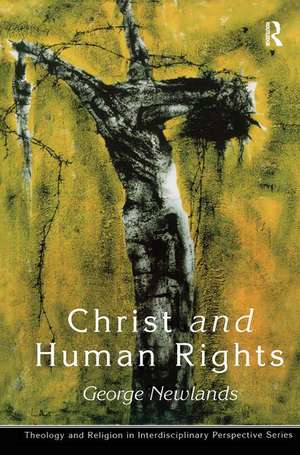Christ and Human Rights: The Transformative Engagement: Theology and Religion in Interdisciplinary Perspective Series
Autor George Newlandsen Limba Engleză Hardback – 2 oct 2017
Preț: 1014.74 lei
Preț vechi: 1441.92 lei
-30% Nou
Puncte Express: 1522
Preț estimativ în valută:
194.20€ • 201.99$ • 160.32£
194.20€ • 201.99$ • 160.32£
Carte tipărită la comandă
Livrare economică 14-28 aprilie
Preluare comenzi: 021 569.72.76
Specificații
ISBN-13: 9781138410473
ISBN-10: 1138410470
Pagini: 228
Dimensiuni: 156 x 234 mm
Greutate: 0.45 kg
Ediția:1
Editura: Taylor & Francis
Colecția Routledge
Seria Theology and Religion in Interdisciplinary Perspective Series
Locul publicării:Oxford, United Kingdom
ISBN-10: 1138410470
Pagini: 228
Dimensiuni: 156 x 234 mm
Greutate: 0.45 kg
Ediția:1
Editura: Taylor & Francis
Colecția Routledge
Seria Theology and Religion in Interdisciplinary Perspective Series
Locul publicării:Oxford, United Kingdom
Cuprins
Contents: Preface; The centrality of rights - introduction; Jesus Christ and the hope of rights; Rights, cultures and transcendence; Rights in the Christological tradition; The hermeneutics of rights in the history of interpretation; Christology in human rights focus - towards a humane Christology; Marginality, Memory and solidarity; Rights reconsidered: building a postfoundational pathway; Christology FOR human rights; Making rights stick; Index.
Notă biografică
George Newlands has been Professor of Divinity at the University of Glasgow, UK, since 1986. He was University Lecturer in Divinity, Cambridge, 1973-86, and Fellow and Dean at Trinity Hall Cambridge, 1982-86. He has written ten books including The Transformative Imagination, Ashgate, 2004.
Recenzii
'There is no one who writes with such incision, perceptiveness and constructive irony. This is a book which will speak to readers across both the disciplines and the professions, from academic theologian to Lieutenant-General.' Iain Torrance, Princeton Theological Seminary, New Jersey 'In this engaging and lively study, George Newlands seeks to connect distinctive christological claims with the more universal moral discourse of human rights. In doing so, he outlines important ways in which Christian theological ethics may appropriate secular claims while remaining faithful to its central theme.' David Fergusson, University of Edinburgh ’... fascinating work ... breaks new ground in demonstrating how rich a source for political reflection Christology can be. ...contains a very useful survey of a wide range of literature. The selection of citations is very judicious and the footnotes are often quite as interesting as the main body of the text. This scholarly and enjoyable work will prove an invaluable resource for anyone with a serious interest in human rights.’ Times Literary Supplement ’Newlands provides an excellent summary of the various, sometimes contending, theories and practices that have emerged in political and social thinking in the last four centuries... one can only recommend a book the strength of which lies in its capacity to demonstrate so ably that in the twenty-first century a Christology constructed without recognition of the issue of human rights will be a deficient Christology.’ Journal of Theological Studies ’... an engaging and informed defence of human rights which should interest a wide readership...’ The Tablet
Descriere
Constructing a Christology which centres on a Christ of the vulnerable and the margins, this book explores the interface between religion, law, politics and violence, East and West, North and South. The history of the use of sacred texts as 'texts of terror' is examined, and theological links to legal and political dimensions explored.


